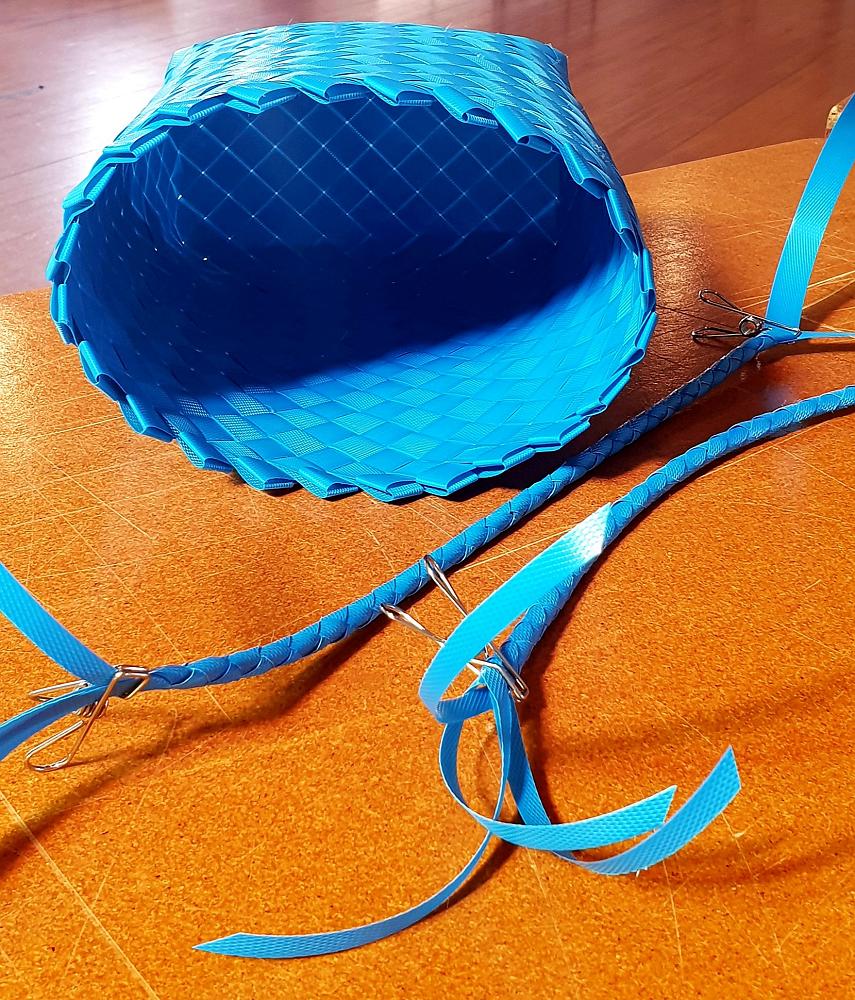
Utilising What We Already Have
Over the summer break, before some of our regular weekly church hall hirers started back up again for the year, my home congregation at Kingsland Trinity Methodist Church decided to make the most of the available space and welcomed Tā'ī Paitai, an accomplished and very talented local artist, to lead a short series of creative workshops for our congregation and the wider community.
Given Tā'ī’s skill set and experience, these workshops could have had us trying our luck at anything from classical opera seria to just about any type of contemporary Polynesian performance art medium there is.
Fortunately, the workshops were on weaving (particularly for beginners), complementing a live art piece that Tā'ī had prepared for Auckland Pride last month.
What made the experience even more fitting, was that it utilised and repurposed resources to be used for weaving, like recyclable polypropylene strapping, which is often disregarded at industrial sites after their cartons or pallets of goods have been opened.
I appreciated this because the thought of my very 'far from nimble' beginner hands butchering beautiful harakeke (flax) or kiri'au (hibiscus bast fibre) so early in this weaving journey was gravely concerning. Even with continued practice, I don't envisage being at the stage of graduating from my trusty supply of strapping scraps (courtesy of my husband's workplace) for a few years yet.
Before getting to the actual weaving stage, with plastic strapping, the preparation process involves cleaning and sanitising, straightening out, and then cutting the pieces to size, which takes time and accuracy. However, this is an absolute breeze in comparison to having to observe the appropriate time and processes to cut, boil, dry, and shape to prepare plant fibres that are more traditionally used for weaving in the Pacific.
My favourite part is the weaving. The sense and challenge of starting something was so exciting and encouraging with Tā'ī guiding us step by step; whilst also reminding us to "take your time", "let the established pattern of the piece guide your next step forward", and "don't be afraid to go back and undo it if you can see that you've made a mistake earlier on in the weave".
The whole experience was rich in both practical learnings for actual weaving, as well as metaphorical learnings, for life.
If you're anything like me, you ideally would love to start and finish weaving a kete in one sitting. But the reality is I never have enough time, focus, or even stamina in my hands to realistically achieve this. So I often have to pause my project, mid-weave, while it's a bit of a messy mix of open strands and clothes pegs that hold what has already been woven together.
I can only resume weaving again after I've either had a break or tended to other more pressing situations or responsibilities.
Following the unexpected Auckland Anniversary Weekend floods, the aftermath of Cyclone Gabrielle, and even the mapping of more extreme weather events forecast for the North Island in the coming weeks, it seems as if we are time and time again being reminded of a new normal, that involves navigating ourselves through a messy "mid-weave" chaos of "strands" and "pegs".
These recent weather extremes have been for some, a rescheduling inconvenience at best, but at worst, have been physically and emotionally harrowing.
Throughout the mess, chaos, and turmoil, it has been truly heartening to witness, feel, and even receive genuine, practical, and generous care and concern from individuals and collectives throughout the Connexion and the wider community.
Many of those helping hands and generous hearts are already accustomed to utilising anything and everything they have on hand to create something that sustains, comforts, or supports those around them who need it most.
President Peter and I uphold in our hearts and our prayers all who have suffered greatly during and following the chaos and turmoil of the recent flooding and cyclone.
We give thanks for and commend every individual and collective who has given their resources, time, and selves to help, support, care, or even advocate for those who have been afflicted, especially those in groups and communities that were already vulnerable and often overlooked beforehand.
Noa'ia 'e garue! Hanisiof ma Alalum!
